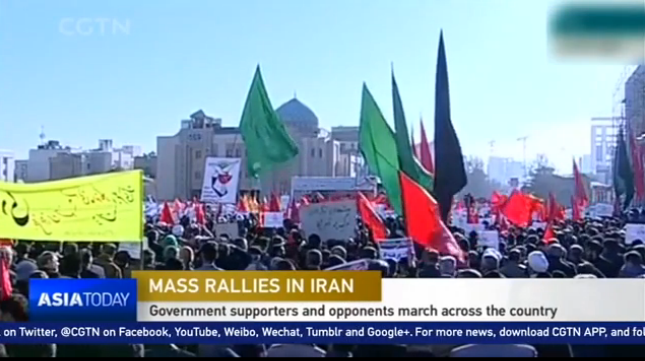Order is preferable over chaos in Middle East
- By Sumantra Maitra
 0 Comment(s)
0 Comment(s) Print
Print E-mail China.org.cn, January 6, 2018
E-mail China.org.cn, January 6, 2018
Will we see an Iranian revolution in 2018? This topic is not a theoretical discussion but what regime-change fanatics are starting their articles with. Iran has witnessed a week of violence, and the protest seems to stem from Iranian economic stagnation. Cries of death to the dictator are in the air, which means death to Iran's supreme leader, which is a capital offence under Iranian law.

Over 20 people are already dead, and Iran's leaders, both moderate and hardliners, are somewhat flabbergasted as to what the next move might be, as no one expected this backlash. Some of them are darkly hinting at a plausible Saudi effort to destabilize the regime by providing funding to Sunni insurgent groups.
This is a tricky situation for the international community, which can be observed from the silence from Iranian partners like India and the EU. Not a single word has come out of the EU bureaucracy, or from traditional regional partners like India. But it also is a tricky situation for traditional Iranian opponents. The Israeli PM, while being superficially supportive, is asking his ministers to pipe down on actively opposing Tehran's government. The British and American governments are also not actively doing anything other than releasing rhetorical attacks on Iran and stating that Iran needs to care about the "democratic aspirations" of its protestors. The reason might be due to the simple fact that everyone is wary of another Middle Eastern spring, this time involving a major military power in Persia – it is a positively nightmarish scenario.
Order is better than chaos and anarchy, that's the fundamental logic behind foreign policy. Unlike in 2009, where actual grassroots level protests rocked the country, this time it is sporadic, and more violent. In fact according to Iran experts on Twitter, the potential of violence is actually scaring off the protesters from a decade back. No one wants to see another Libya or Syria in their country, not even the ones who are arguably repressed.
That's not noticeable amongst the twitter experts and social media commentators however. But given the experience of Iraq, there are questions which need to be answered before anyone can suggest any policy course. Who are the people pushing for a Persian spring in Iran that are based in U.S. and Europe, and how much does the foreign based expat Iranian community's aspirations reflect the Iranians who are in the country? Iran is after all an electoral democracy, that's more than could be said about any Sunni powers in the region. Iranian expats, especially those who have lived for more than two generations abroad will have a warped view of realities on the ground, and may view the situation from their own perspectives, which might or might not be beneficial for the national interests of other powers. Imagine the arguments from Iraqi expats about toppling Saddam, or by Libyan expats about Gaddafi. How's that working out?
Secondly, everyone should be careful before they argue about interfering in the sovereign matters of another power. Where does this stop? Tomorrow, if Iran funds Occupy Wall Street or Black Lives matters, there won't be any logical counter arguments against such. There's a reason Westphalian nation states agreed to the principle of non-interference in the sovereignty of other states. It is because the concept is like nuclear deterrence, a sort of Mutually Assured Destruction.
One therefore might be very careful of what one wishes for, especially from a Western foreign policy perspective. Regimes might be brutal, but as long as they are providing stability and order, they are better than complete chaos. Iran, and Iran funded Shia militias are all over the region from Yemen to Syria. The Iranian government still enjoys a majority of support from the people of Iran, who more importantly than not, do not want any foreign interference. The previous "springs" also didn't result in liberal outcomes; from Iraq, to Egypt, Bahrain, Libya and Syria, and there's no evidence to believe this time it will be any different. The prudent policy is therefore to wait and observe, instead of pouring fuel on the fire.
Sumantra Maitra is a columnist with China.org.cn. For more information please visit:
http://www.shenbo75.com/opinion/SumantraMaitra.htm
Opinion articles reflect the views of their authors only, not necessarily those of China.org.cn.





